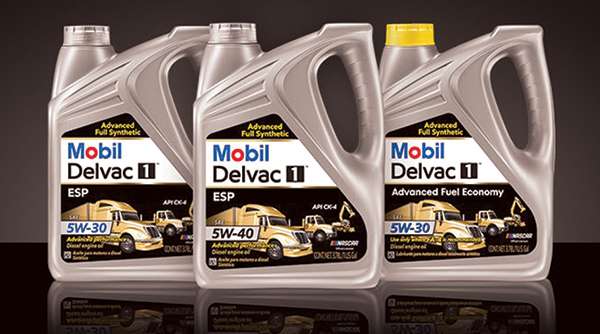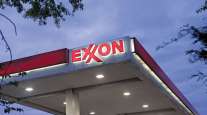Senior Reporter
ExxonMobil Launches New Synthetic Engine Oils to Meet Expected Growth

ExxonMobil introduced three Mobil Delvac 1 synthetic heavy-duty diesel engine oils for use in on-highway and off-highway applications, with the expectation that the oils’ promised improvements in fuel efficiency and maintenance will spur greater industry adoption.
“I think you are going to see, just as in the automotive market where semi-synthetics and full synthetics are very prevalent — especially in the lower viscosities — you’ll see the commercial vehicle lubricants for diesel engine oils follow suit,” Paul Cigala, commercial vehicle applications engineer at ExxonMobil, told Transport Topics.

The new oils include the Mobil Delvac 1 ESP 5W-30 and 5W-40, intended for on-highway or pickup-and-delivery trucks, or severe service off-highway trucks, according to the company. Both oils are based on the CK-4 specification and compatible with most generations of engines.
The Mobil Delvac 1 Advanced Fuel Economy 5W-30 is designed to meet the most stringent objectives for fuel efficiency and is to be used only in the latest low-emission engines. It is based on the FA-4 specification.
Detroit is the only engine maker to approve FA-4 for backward compatibility with older engines, Cigala said. Detroit is a brand of Detroit Diesel Corp., a subsidiary of Daimler Trucks North America.
“Everybody else is looking at it going forward but really hasn’t embraced it as much as we thought they would from the start,” Cigala said.
He attributed that delay to characteristics of their engines.
“Some was metallurgy-related, some heat management-related. So I think they are looking at the next round of the Phase 2 emissions-reduction regulations when the hardware may change,” Cigala said.
The truck and engine sections of Phase 2 are to be rolled out in 2021, 2024 and 2027.
Tests carried out by the Millbrook Group have shown that Mobil Delvac 1 ESP 5W-30 oil helps improve fuel economy up to 2.6% in city driving conditions when compared with conventional mineral-based oils.
The FA-4 designation potentially adds 0.5% of fuel economy, Cigala said.
The American Petroleum Institute has licensed about 654 CK-4 and 83 FA-4 oils since the specifications were launched Dec. 1, 2016. It did not immediately reply to an inquiry as to how many of those licensed oils were synthetic.
API, however, expects the licenses for both oils will continue to increase and that FA-4 will see growth as more new engines that require lower-viscosity engine oils are placed in service in the coming years, according to the trade group.
“My sense is that carriers are looking seriously at synthetics, especially as they upgrade to newer equipment, where there is more of a sense of security that the engines will function reliably and efficiently, and can go longer on maintenance cycles that are a derivative of using synthetics,” said Jack Legler, technical director of the Technology & Maintenance Council of American Trucking Associations.
ExxonMobil’s big push a year ago was to market its most popular engine oils in the new CK-4 specification, Cigala said, adding that these include Mobil Delvac 1300 Super and Mobil Delvac Extreme, a synthetic blend.
“Synthetic engine oils are a little higher priced, and something we could hold back and finish up our field testing, gather more data and then have a more robust marketing campaign for now,” he said.
Separately, changes to natural gas engine specifications should be coming out next year, bringing the engines more in line with diesel engine oil drain intervals, Cigala said.
“Oil change intervals on natural gas engines are definitely a lot shorter than what we see on the diesel side,” he said. “But I think with the new specs, it will be more in line and customers may be a little more open to adding some [natural gas engines] into their fleet.”




